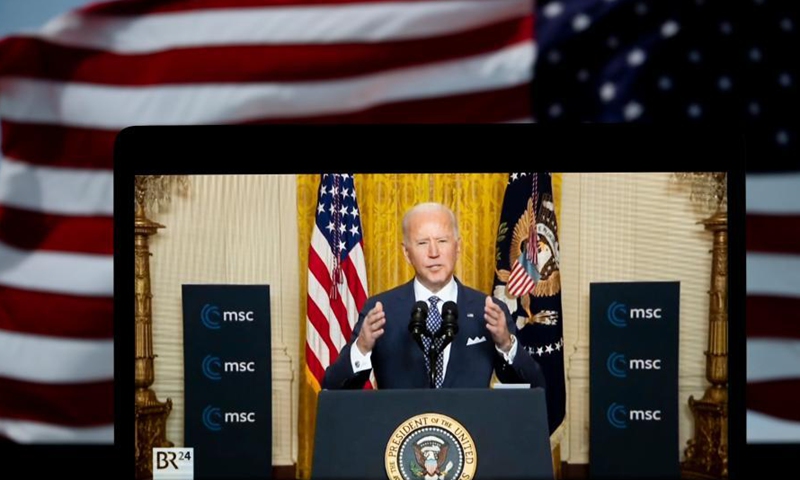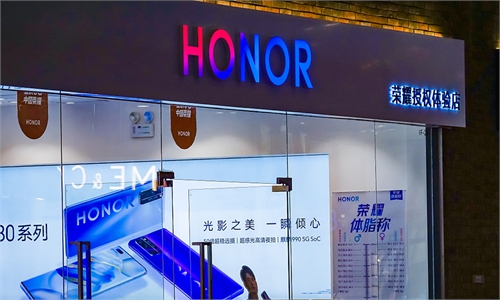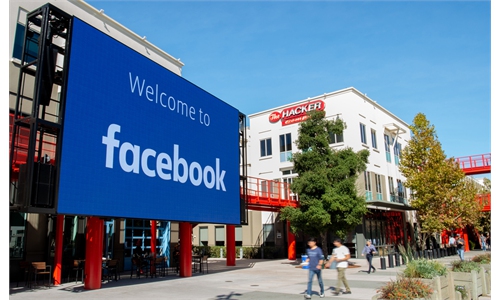
Photo taken in Arlington, Virginia, the United States, on Feb 19, 2021 shows a screen displaying U.S. President Joe Biden speaking in Washington, D.C. during a virtual event with the Munich Security Conference in a video provided by the U.S. State Department. Biden said on Friday that the United States is returning to the transatlantic partnership and will address global challenges like climate change and the COVID-19 pandemic.Photo:Xinhua
The Biden administration will form a task force to deal with major cyberattacks that Microsoft claimed were linked to China, which some Western media are also hyping that the attacks were carried out by a group of Chinese hackers backed by the Chinese government.
The establishment of the task force would start a public opinion war without any evidence, which will not solve the real problem on cybersecurity issues, but will poison relations between the two countries, Chinese experts said, urging the US to form a coordination mechanism based on equal footing with China to address cybersecurity issues.
The task force, called Unified Coordination Group, was initiated by the US National Security Council, and will be joined by FBI, the Cybersecurity and Infrastructure Security Agency (CISA) and others, CNN reported, citing a US official.
Cybersecurity is a long-term issue between China and the US, but the US has always lacked a sincere attitude in solving the real problems and has been blindly accusing China of cybersecurity issues without providing any evidence in recent years, Lü Xiang, an expert in US studies with the Chinese Academy of Social Sciences in Beijing, told the Global Times, noting that such accusations are meaningless.
"The Biden administration should make a request for consultations with China on this issue, if it is a truly rational and sober government," Lü said,noting that the US has been ignoring China's proposal to set up an equal coordination mechanism addressing cybersecurity issues.
Microsoft claimed on March 2 that a group of hackers had exploited the vulnerabilities in its software to hit its Exchange email servers, and the Microsoft Threat Intelligence Center identified that Hafnium, "a group assessed to be state-sponsored and operating out of China," was behind the hack.
In another post, Microsoft claimed that Hafnium conducts its operations primarily from leased virtual private servers (VPS) in the US, which indicates that the attack is related with China.
In response to such claims and media reports that Chinese hackers carried out the attacks, Chinese Foreign Ministry spokesperson Wang Wenbin urged relevant companies and media to be responsible to ascertain cybersecurity cases, base their judgment of cyber issues on sufficient evidence rather than baseless speculation and accusations.
China firmly opposes and cracks down on any form of cyberattack and cybertheft in accordance with law, and this position has always been clear, Wang stressed.
This is not the first time that the Biden administration formed a task force against China. Previously, Biden announced on February 10 a 'China Task Force' within the US Department of Defense to provide "a baseline assessment of department policies, programs, and processes in regard to the challenge China poses," within four months, reports said. Biden later appointed three new members to the group, who reportedly made tough speeches against China during the Trump administration.
The establishment of such task forces is a response of the Biden administration to face the pressure brought by China's rapid development, and also reveals that a clear strategy toward China, which should be in place earlier, has yet to be formed in the new administration, experts noted.



